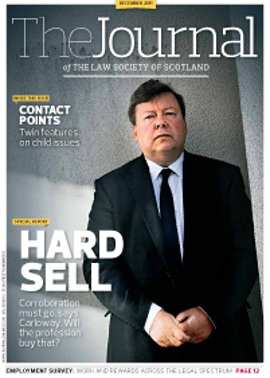Opinion

Just call me naive. Four decades plus, I plied my trade in the criminal courts, usually trying to flog defences to 15 streetwise sceptics. Cavil though I did at times, I nonetheless relished the warm glow generated by the certainty that my clients, to the majority of whom Dante would have been only too thrilled to allocate berths in one of the circles of hell, enjoyed the benefits of a quintessentially fair and equitable legal system.
Broadly speaking, politics and prejudice were barred admittance. Arms were more or less equal; funding was generally available; judges often knew what they were doing. And when all else failed, there was a jury to provide the reality check. So it came about that when I retired earlier this year, I believed I was leaving behind a world where law, however applied, tended to embrace justice.
All it has taken to open my eyes to the existence of what is manifestly a parallel universe is a few months of volunteering with Scottish Refugee Council. Both my parents escaped the ovens because back then, Britain permitted them to clamber over the fence. Can you credit it when I tell you that I am relieved that they were refugees in 1939 and not 2009? Just what is one to make of a jurisprudence which, in denying asylum to those in flight from Iraq, Afghanistan or Somalia, holds that their fears of return are unfounded?
Today’s asylum seekers struggle to survive in a political climate where there is virtually a bipartisan commitment to hauling up the drawbridge. The UK Border Agency, tasked with controlling immigration, fails at its peril to operate within the parameters of a policy intended to minimise numbers. Mercifully, the courts do from time to time step in to save the day, but scarcity of resources limits such interventions.
Scottish Refugee Council labours daily to rescue bewildered asylum seekers from the sea of bureaucratic regulation and restrictive supervision which is the UK’s current asylum system. There are many difficulties and complexities; here I can only afford you a peek into the particular chamber of horrors where I now find myself desperately endeavouring to be of some use.
Refused asylum seekers, not yet in a position to depart due to reasons beyond their control – most alarmingly because going home would mean that their need for international protection was not being met – may be entitled to the largesse envisaged by s 4 of the Immigration and Asylum Act 1999.
A successful s 4 application brings no-choice shared accommodation and no-cash plastic with limited purchasing powers of about £35 per week.
“Destitution” (eat your heart out, Mr Dickens) is an essential prerequisite, by which is meant no foreseeable access to bed and board. Proof of destitution is but the first hurdle to be crossed. Entitlement only arises where the destitute claimant passes one of five specified tests whose criteria can frequently be met in theory alone. To take just two examples, the “no safe route to country of origin” test applies, according to Government and law, to nowhere in the world today. The “physical impediment to travel” test does not apply to a woman six months into her pregnancy.
Section 4 refusal leads to life on the streets or, where fortune shines, to temporary shelter with a charity. First-instance s 4 rulings are administrative, another word for faceless. Inexplicably, some decisions take over 100 days to arrive, 100 days of destitute limbo.
There is a single tier appeal system, the relevant tribunal sitting only in London. Appellants who seek representation are dependent on pro bono practitioners, if available.
Scottish Refugee Council assists destitute claimants who have been refused support by providing help in completing the appeal form, in preparing the evidence to back up their claim and in explaining the process and any correspondence. Of the appeals with which the Council has been most recently involved, 60% have seen the original decision overturned.
Destitution, deprivation and demonisation are scarcely the hallmarks of a fair legal system equitably applied. Scottish Refugee Council, which believes that those seeking asylum should be treated fairly and humanely, campaigns to change a system which leaves people destitute.
However, its efforts are inevitably reliant on its resources. It needs the help, professional and, yes, financial, of any and every lawyer who sees the need to restore a sense of pride in the theory and practice of asylum law. This winter it launches its Protection Appeal. Those fleeing to Scotland from war, torture and persecution need you.
In this issue
- Involving the named person
- Private investigators - mitigating the risks
- Human inventions
- Smoother passage
- Rough law of the street
- Council profile
- Opinion
- Book reviews
- President's column
- Mapping in the Land Register
- Alien concept
- Size does matter
- Case proved?
- Reading for pleasure
- Relocation revisited
- Where Parliament fears to tread...
- Cadder's growing family
- Landlord splits
- Five-year-old experts
- Common sense to the fore
- Beware: earn-outs
- Steering with one hand
- Scottish Solicitors' Discipline Tribunal
- Missives in motion
- Constitution on track
- From the Brussels office
- Law reform update
- Ask Ash
- Outside the box






